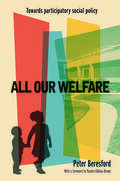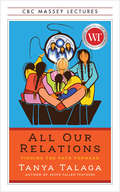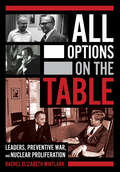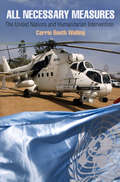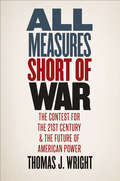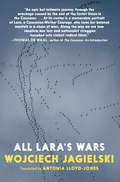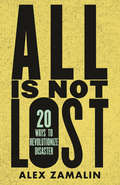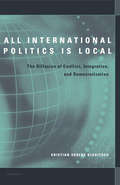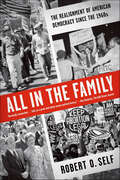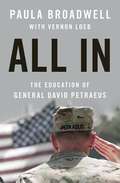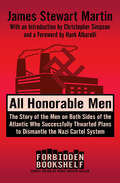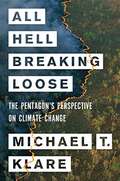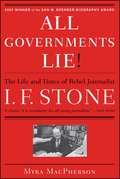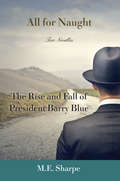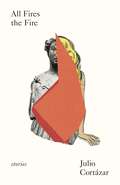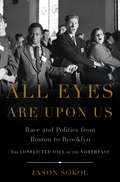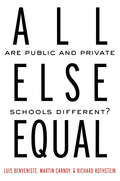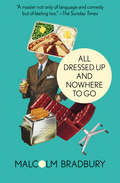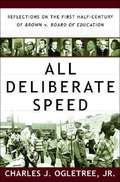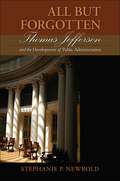- Table View
- List View
All Our Welfare: Towards Participatory Social Policy
by Peter BeresfordThe UK welfare state is under sustained ideological and political attack. It has also been undermined by accusations of paternalism and past failures to engage with the very people it is intended to help. This unique book is the first to critique the past, present and future welfare state from a participatory perspective. Peter Beresford, champion of user involvement, draws on pioneering theories and practice of welfare service user movements to offer a blueprint for a new participatory social policy. He controversially challenges orthodox social policy and the limitations of both Fabian and Neo-liberal perspectives in engaging people to improve their own welfare, drawing on service users ‘ own ideas and experience, including fascinating vignettes from his own family’s experience, to demonstrate the value of ‘user knowledge’. Filling a much-needed gap in the literature, this accessible text will provide a great introduction for students and a road-map for practitioners of an alternative vision for a future participatory and sustainable social policy. It will also command much wider interest from everyone concerned with how we look after each other in future in society.
All Our Relations: Finding the Path Forward (The CBC Massey Lectures)
by Tanya TalagaTanya Talaga, the bestselling author of Seven Fallen Feathers, calls attention to an urgent global humanitarian crisis among Indigenous Peoples — youth suicide.“Talaga’s research is meticulous and her journalistic style is crisp and uncompromising. She brings each story to life, skillfully weaving the stories of the youths’ lives, deaths, and families together with sharp analysis… The book is heartbreaking and infuriating, both an important testament to the need for change and a call to action.” — Publishers Weekly *Starred Review*“Talaga has crafted an urgent and unshakable portrait of the horrors faced by Indigenous teens going to school in Thunder Bay, Ontario… Talaga’s incisive research and breathtaking storytelling could bring this community one step closer to the healing it deserves.” — Booklist *Starred Review*In this urgent and incisive work, bestselling and award-winning author Tanya Talaga explores the alarming rise of youth suicide in Indigenous communities in Canada and beyond. From Northern Ontario to Nunavut, Norway, Brazil, Australia, and the United States, the Indigenous experience in colonized nations is startlingly similar and deeply disturbing. It is an experience marked by the violent separation of Peoples from the land, the separation of families, and the separation of individuals from traditional ways of life — all of which has culminated in a spiritual separation that has had an enduring impact on generations of Indigenous children. As a result of this colonial legacy, too many communities today lack access to the basic determinants of health — income, employment, education, a safe environment, health services — leading to a mental health and youth suicide crisis on a global scale. But, Talaga reminds us, First Peoples also share a history of resistance, resilience, and civil rights activism. Based on her Atkinson Fellowship in Public Policy series, All Our Relations is a powerful call for action, justice, and a better, more equitable world for all Indigenous Peoples.
All Options on the Table: Leaders, Preventive War, and Nuclear Proliferation (Cornell Studies in Security Affairs)
by Rachel Elizabeth WhitlarkWhen is preventive war chosen to counter nuclear proliferation? In All Options on the Table, Rachel Elizabeth Whitlark looks beyond systemic and slow-moving factors such as the distribution of power. Instead, she highlights individual leaders' beliefs to explain when preventive military force is the preferred strategy. Executive perspective—not institutional structure—is paramount. Whitlark makes her argument through archivally based comparative case studies. She focuses on executive decision making regarding nuclear programs in China, North Korea, Iraq, Pakistan, and Syria. This book considers the actions of US presidents John F. Kennedy, Lyndon B. Johnson, George H. W. Bush, Bill Clinton, and George W. Bush, as well as Israeli prime ministers Menachem Begin, Yitzhak Rabin, and Ehud Olmert. All Options on the Table demonstrates that leaders have different beliefs about the consequences of nuclear proliferation in the international system and their state's ability to deter other states' nuclear activity. These divergent beliefs lead to variation in leaders' preferences regarding the use of preventive military force as a counter-proliferation strategy. The historical evidence amassed in All Options on the Table bears on strategic assessments of aspiring nuclear powers such as Iran and North Korea. Whitlark argues that only those leaders who believe that nuclear proliferation is destabilizing for the international system will consider preventive force to counter such challenges. In a complex nuclear world, this insight helps explain why the use of force as a counter-proliferation strategy has been an extremely rare historical event.
The ALL NEW Don't Think of an Elephant!
by George LakoffSince it became an international bestseller in 2004, Don't Think of an Elephant! has been the definitive handbook for progressives who want to articulate their goals and values to voters, understand how conservatives think and why people often vote against their best interests, and frame the political debate. Completely revised and updated to tackle today's issues, the 10th Anniversary Edition not only explains what framing is and how it works but also reveals why, after a brief stint of winning the framing wars in the 2008 elections, the Democrats have gone back to losing them, and what can be done about it. In this powerful new volume, George Lakoff delves into the issues that will dominate the midterm elections in 2014, the coming presidential elections, and beyond. He examines the current progressive and conservative frames on climate change, inequality, immigration, education, abortion, marriage, healthcare, national security, energy, and more. He explores why some issues have been difficult to frame, guides readers on how to frame complex issues without losing important context, and drives home the important differences between framing and spin. Do you think facts alone can win a debate? Do you think you know what makes a Tea Party follower tick? Do you think you understand how to communicate on key issues that can improve peoples' lives? Whether you answer yes or no, the insights in Don't Think of an Elephant! will not only surprise you, but also give you the tools you need to develop frames that work, and eradicate frames that backfire.
All Necessary Measures: The United Nations and Humanitarian Intervention (Pennsylvania Studies in Human Rights)
by Carrie Booth WallingWhat prompts the United Nations Security Council to engage forcefully in some crises at high risk for genocide and ethnic cleansing but not others? In All Necessary Measures, Carrie Booth Walling identifies several systematic patterns in the stories that council members tell about conflicts and the policy solutions that result from them. Drawing on qualitative comparative case studies spanning two decades, including situations where the council has intervened to stop mass killing (Somalia, Bosnia-Herzegovina, and Sierra Leone) as well as situations where it has not (Rwanda, Kosovo, and Sudan), Walling posits that the arguments council members make about the cause and character of conflict as well as the source of sovereign authority in target states have the potential to enable or constrain the use of military force in defense of human rights.At a moment when constructivist scholars in international relations are pushing beyond empirical claims for the value of norms and toward critical analysis of such norms, All Necessary Measures establishes discourse's real-world explanatory power. From her comparative chronology, Walling demonstrates that humanitarian intervention becomes possible when the majority of Security Council members come to a shared understanding of the conflict, perpetrators, and victims—and probable when the Council understands state sovereignty as complementary to human rights norms. By illuminating the relationship between national interests and the core values of Security Council members and how it influences decision-making, All Necessary Measures suggests when and where the Security Council is likely to intervene in the future.
All Men Want to Know: 'Intense, gorgeous, troubling, seductive' SARAH WATERS
by Nina Bouraoui'Intense, gorgeous, troubling, seductive - a novel that has to be surrendered to rather than read' Sarah Waters AN INTERNATIONAL BESTSELLERWINNER OF AN ENGLISH PEN TRANSLATES AWARD All Men Want to Know traces Nina Bouraoui's blissful childhood in Algeria, a wild, sun-soaked paradise, with hazy summer afternoons spent swimming, diving, and driving across the desert. Her mother is French, her father Algerian; when racial tensions begin to surface in their neighbourhood, her mother suffers an unspeakable act of violence that forces the family to flee the country. In Paris, eighteen-year-old Nina lives alone. It's the 1980s. Four nights a week she makes her way to The Kat, a legendary gay nightclub, where she watches women from the sidelines, afraid of her own desires, her sudden and intoxicating freedom. In her solitude, she starts to write - and finds herself writing about her mother.All Men Want to Know is a haunting, lyrical international bestseller about mothers and daughters, about shame and sexuality, about existing between two cultures and belonging to neither. A phenomenon in France, this is a defining portrait of womanhood from one of Europe's greatest living writers. 'Blown away by the power and lyricism of All Men Want to Know. What a book. Read it' Niven Govinden, author of THIS BRUTAL HOUSE 'Magnificent... a captivating autobiographical novel' Elle 'A tour de force' Le Figaro'Haunting, spell-binding, luminous' Lire
All Measures Short of War: The Contest for the Twenty-First Century and the Future of American Power
by Thomas WrightA groundbreaking look at the future of great power competition in an age of globalization and what the United States can do in response The two decades after the Cold War saw unprecedented cooperation between the major powers as the world converged on a model of liberal international order. Now, great power competition is back and the liberal order is in jeopardy. Russia and China are increasingly revisionist in their regions. The Middle East appears to be unraveling. And many Americans question why the United States ought to lead. What will great power competition look like in the decades ahead? Will the liberal world order survive? What impact will geopolitics have on globalization? And, what strategy should the United States pursue to succeed in an increasingly competitive world? In this book Thomas Wright explains how major powers will compete fiercely even as they try to avoid war with each other. Wright outlines a new American strategy—Responsible Competition—to navigate these challenges and strengthen the liberal order.
All Lara's Wars
by Wojciech JagielskiThe true story of one woman's struggle to save her sons from radicalization by Chechen partisans, as told by a seasoned war reporter.In All Lara's Wars, the great events of the last half-century--the realignment of Eastern Europe after the fall of the Soviet Union, and the rise in the Middle East of ISIS and its quest for a new Caliphate--converge in this account of a Chechen-Georgian family whose two sons become radicalized, and how their mother--Lara--travels to Syria by bus and at great risk, not to join them but to bring them home. By then, the older son is a high level commander and the younger son a respected soldier in ISIS's army. The story is told with a sense of wonder at the contemporary world and all the ways it resembles a primitive and violent land where all struggles are to the death, and there is an epic battle going on between forces of good and evil that cannot be understood other than as mythic and larger than life. Lara is a Kist--one of a tiny ethnicity that crossed the Caucasus mountains a century ago to settle in the remote Pankisi Gorge in northern Georgia, a peaceful and isolated paradise. She married a Chechen, moved to Grozny, and became the mother of two sons. When war came to Chechnya, she took her children home to the safe Georgian valley, and later sent them to Western Europe to live with their father--to protect them from the influence of the radical Islamic freedom fighters who had come to the Pankisi Gorge as refugees from the Chechnyan wars. As in all of Wojciech Jagielski's books, he tells here the story of any modern war, how the individual lives of civilians and combatants are obliterated in the sweep of the larger narrative--and how the humanity of these individual lives is revealed, and the price paid in human endurance and persistence and loss. Jagielski observes, listening to Lara and letting her story emerge through the filter of his literary skill. This unusual reportage tells us the facts of the Chechnyan wars and the reality of the Syrian war from the viewpoint of ISIS recruits, but it is also the true account of one ordinary family that became part of the larger tragedy that has claimed so many victims in recent years.
All Is Not Lost: 20 Ways to Revolutionize Disaster
by Alex ZamalinAn uplifting look at how organizers in the past have successfully leveraged crises into emancipatory politics, and a plea for continued progressive movement building in our tumultuous social climateFrom the climate apocalypse and COVID-19 to double digit unemployment to Donald Trump and the rise of far-right white nationalists—disasters are everywhere we look.While these disasters often leave us feeling hopeless and withdrawn, scholar Alex Zamalin argues that pessimism cannot be the only response. Silence and inaction only perpetuate mass suffering and inequality. Instead, All Is Not Lost suggests that following every crisis emerges new political opportunity for changing our politics and everyday lives.Blending intellectual history, biography, and political critique, Zamalin offers 20 specific lessons for our present moment, turning to moments in history to demonstrate how various figures in the past have successfully leveraged struggles into sources of political action and freedom. The lessons—on how to resist, how to speak, organize, treat others, think politically, memorialize, dream, write, occupy, build, and act—all build toward one truth: though disaster is something we cannot control from arriving, we can control how we confront it and what we build in its place. Using examples from the 17th century to the present, All Is Not Lost reminds readers to not back down in the face of crisis and instead offers radical lessons of continued resistance and movement building to create a successful progressive coalition.
All International Politics Is Local: The Diffusion Of Conflict, Integration, and Democratization
by Jeffrey D. Mason J. Ellen GainorThe world can be broken up into clusters: mature democracies, transforming democracies and autocracies.
All in the Family: The Realignment of American Democracy Since the 1960s
by Robert O. SelfIn the 1960s, Lyndon Johnson's Great Society and War on Poverty promised an array of federal programs to assist working-class families. In the 1980s, Ronald Reagan declared the GOP the party of "family values" and promised to keep government out of Americans' lives. Again and again, historians have sought to explain the nation's profound political realignment from the 1960s to the 2000s, five decades that witnessed the fracturing of liberalism and the rise of the conservative right. The award-winning historian Robert O. Self is the first to argue that the separate threads of that realignment—from civil rights to women's rights, from the antiwar movement to Nixon's "silent majority," from the abortion wars to gay marriage, from the welfare state to neoliberal economic policies—all ran through the politicized American family.Based on an astonishing range of sources, All in the Family rethinks an entire era. Self opens his narrative with the Great Society and its assumption of a white, patriotic, heterosexual man at the head of each family. Soon enough, civil rights activists, feminists, and gay rights activists, animated by broader visions of citizenship, began to fight for equal rights, protections, and opportunities. Led by Pauli Murray, Gloria Steinem, Harvey Milk, and Shirley Chisholm, among many others, they achieved lasting successes, including Roe v. Wade, antidiscrimination protections in the workplace, and a more inclusive idea of the American family.Yet the establishment of new rights and the visibility of alternative families provoked, beginning in the 1970s, a furious conservative backlash. Politicians and activists on the right, most notably George Wallace, Phyllis Schlafly, Anita Bryant, and Jerry Falwell, built a political movement based on the perceived moral threat to the traditional family. Self writes that "family values" conservatives in fact "paved the way" for fiscal conservatives, who shared a belief in liberalism's invasiveness but lacked a populist message. Reagan's presidency united the two constituencies, which remain, even in these tumultuous times, the base of the Republican Party. All in the Family, an erudite, passionate, and persuasive explanation of our current political situation and how we arrived in it, will allow us to think anew about the last fifty years of American politics.
All In: The Education of General David Petraeus
by Paula BroadwellGeneral David Petraeus is the most transformative leader the American military has seen since the generation of Marshall. In the New York Times bestseller All In, military expert Paula Broadwell examines Petraeus's career, his intellectual development as a military officer, and his impact on the U. S. military. Afforded extensive access by General Petraeus, his mentors, his subordinates, and his longtime friends, Broadwell reported on the front lines of fighting and at the strategic command in Afghanistan to chronicle the experiences of this American general as they were brought to bear in the terrible crucible of war. All In draws on hundreds of hours of exclusive interviews with Petraeus and his top officers and soldiers to tell the inside story of this commander's development and leadership in war. When Petraeus assumed command in Afghanistan in July 2010, the conflict looked as bleak as at any moment in America's nine years on the ground there. Petraeus's defining idea—counterinsurgency—was immediate put to its most difficult test: the hard lessons learned during the surge in Iraq were to be applied in a radically different theater. All In examines the impact in Afghanistan of new counterinsurgency as well as counterterrorism strategies through the commands of several Petraeus protégés. Broadwell examines his evolution as a solider from his education at West Point in the wake of Vietnam to his earlier service in Central America, Haiti, Kuwait, Bosnia, and Iraq. All In also documents the general's role in the war in Washington, going behind the scenes of negotiations during policy reviews of the war in Afghanistan in Congress, the Pentagon, and the White House. Broadwell ultimately appraises Petraeus's impact on the entire U. S. military: Thanks to this man's influence, the military is better prepared to fight using a comprehensive blend of civil-military activities. As America surveys a decade of untraditional warfare, this much is clear: The career of General David Petraeus profoundly shaped our military and left an indelible mark on its rising leaders. .
All I Ever Wanted to Know about Donald Trump I Learned From His Tweets: A Psychological Exploration of the President via Twitter
by John Gartner Rachel MontgomeryWe had to figure that by electing a decidedly non-career-politician, that things would be… different. But is this any way to run a country? Many opinions have been shared about Donald Trump, but we can learn so much more about the man via what he himself says – in 140 characters or less. Trump has tweeted nearly 35,000 times since launching @realDonaldTrump in March 2009, commenting on everything from immigration to policy climate change to even pop culture. As President, Trump tweets without ceasing, sometimes a dozen times a day, seemingly during important events and meetings. Apparently he believes that twitter is an effective tool for him to drive his agenda. But it’s one thing to be a brash, bold, and outspoken, maverick businessman, it’s quite another when the leader of the most powerful country in the world is talking politics as stream of consciousness.
All Honorable Men: The Story of the Men on Both Sides of the Atlantic Who Successfully Thwarted Plans to Dismantle the Nazi Cartel System (Forbidden Bookshelf #21)
by Mark Crispin Miller Christopher Simpson Hank Albarelli Jr. James Stewart MartinA scathing attack on Wall Street's illegal ties to Nazi Germany before WWII--and the postwar whitewashing of Nazi business leaders by the US government Prior to World War II, German industry was controlled by an elite group who had used their money and influence to help bring the Nazi Party to power. After the Allies had successfully occupied Germany and removed the Third Reich, the process of reconstructing the devastated nation's economy began under supervision of the US government. James Stewart Martin, who had assisted the Allied forces in targeting key areas of German industry for aerial bombardment, returned to Germany as the director of the Division for Investigation of Cartels and External Assets in American Military Government, a position he held until 1947. Martin was to break up the industrial machine these cartels controlled and investigate their ties to Wall Street. What he discovered was shocking. Many American corporations had done business with German corporations who helped fund the Nazi Party, despite knowing what their money was supporting. Effectively, Wall Street's greed had led them to aid Hitler and hinder the Allied effort. Martin's efforts at decartelization were unsuccessful though, largely due to hindrance from his superior officer, an investment banker in peacetime. In conclusion, he said, "We had not been stopped in Germany by German business. We had been stopped in Germany by American business." This exposé on economic warfare, Wall Street, and America's military industrial complex includes a new introduction by Christopher Simpson, author of Blowback:America's Recruitment of Nazis and Its Destructive Impact on Our Domestic and Foreign Policy, and a new foreword from investigative journalist Hank Albarelli.
All Hell Breaking Loose: The Pentagon's Perspective On Climate Change
by Michael T. KlareAll Hell Breaking Loose is an eye-opening examination of climate change from the perspective of the U.S. military. The Pentagon, unsentimental and politically conservative, might not seem likely to be worried about climate change―still linked, for many people, with polar bears and coral reefs. Yet of all the major institutions in American society, none take climate change as seriously as the U.S. military. Both as participants in climate-triggered conflicts abroad, and as first responders to hurricanes and other disasters on American soil, the armed services are already confronting the impacts of global warming. The military now regards climate change as one of the top threats to American national security―and is busy developing strategies to cope with it. Drawing on previously obscure reports and government documents, renowned security expert Michael Klare shows that the U.S. military sees the climate threat as imperiling the country on several fronts at once. Droughts and food shortages are stoking conflicts in ethnically divided nations, with “climate refugees” producing worldwide havoc. Pandemics and other humanitarian disasters will increasingly require extensive military involvement. The melting Arctic is creating new seaways to defend. And rising seas threaten American cities and military bases themselves. While others still debate the causes of global warming, the Pentagon is intensely focused on its effects. Its response makes it clear that where it counts, the immense impact of climate change is not in doubt.
All Hail the Queen: Twenty Women Who Ruled
by Jennifer LewisDiscover twenty true stories of royal intrigue, power, and passion, brought to life through the gorgeous illustrations of Jennifer Orkin Lewis and the witty words of Shweta Jha. From Cleopatra to Empress Wu Zetian, Marie Antoinette to Queen Liliuokalani of Hawaii, these extraordinary female monarchs from all over the world have captured imaginations throughout the ages. With a deluxe foil-spangled two-piece case, this elegant and diverse celebration of women in charge makes the perfect Mother's Day or girlfriend go-to gift for the queen in our lives.
All Governments Lie: The Life and Times of Rebel Journalist I. F. Stone
by Myra MacphersonHere, for the first time, acclaimed journalist and author Myra MacPherson brings the legendary Stone into sharp focus. Rooted in fifteen years of research, this monumental biography includes information from newly declassified international documents and Stone's unpublished five-thousand-page FBI file, as well as personal interviews with Stone and his wife, Esther; with famed modern thinkers; and with the best of today's journalists. It illuminates the vast sweep of turbulent twentieth-century history as well as Stone's complex and colorful life. The result is more than a masterful portrait of a remarkable character; it's a far-reaching assessment of journalism and its role in our culture.
All God's Children: The Bosket Family and the American Tradition of Violence
by Fox ButterfieldA timely reissue of Fox Butterfield's masterpiece, All God's Children, a searing examination of the caustic cumulative effect of racism and violence over 5 generations of black Americans. Willie Bosket is a brilliant, violent man who began his criminal career at age five; his slaying of two subway riders at fifteen led to the passage of the first law in the nation allowing teenagers to be tried as adults. Butterfield traces the Bosket family back to their days as South Carolina slaves and documents how Willie is the culmination of generations of neglect, cruelty, discrimination and brutality directed at black Americans. From the terrifying scourge of the Ku Klux Klan during Reconstruction to the brutal streets of 1970s New York, this is an unforgettable examination of the painful roots of violence and racism in America.
All for Naught: The Rise and Fall of President Barry Blue: Two Novellas
by M. E. SharpeAll for Naught tells the story of Richard Melmont, a billionaire many times over. His wife Maria, daughter Barbara, and son Daniel are appalled by his cutthroat methods and even more appalled by the weapons system he is developing. Is he deliberately deceiving government officials, bankers, and the general public, or is he deceiving himself? In The Rise and Fall of President Barry Blue, an experienced White House correspondent is trying to sort through contradictory insider accounts to get a true picture of an elusive president.
All Fires the Fire: All Fires One And The Same (Coleccion Cara Y Cruz)
by Julio Cortázar Suzanne Jill Levine“One of the most adventurous and rewarding collections since the publication of Cortázar’s own Blow-up.” —Los Angeles Times A traffic jam outside Paris lasts for weeks. Che Guevara and Fidel Castro meet on a mountaintop during the Cuban Revolution. A flight attendant becomes obsessed with a small Greek island, resulting in a surreal encounter with death. In All Fires the Fire, Julio Cortázar (author of Hopscotch and the short story “Blow-Up” ) creates his own mindscapes beyond space and time, where lives intersect for brief moments and situations break and refract. All Fires the Fire contains some of Julio Cortázar’s most beloved stories. It is a classic collection by “one of the world’s great writers” (Washington Post).
All Eyes are Upon Us: Race and Politics from Boston to Brooklyn
by Jason SokolFrom the 19th century, when northern cities were home to strong abolitionist communities and served as a counterpoint to the slaveholding South, through the first half of the 20th century, when the North became a destination for African Americans fleeing Jim Crow, the Northeastern United States has had a long history of acceptance and liberalism. But as historian Jason Sokol reveals in All Eyes Are Upon Us, northern states like Massachusetts, New York, and Connecticut were also strongholds of segregation and deep-seated racism. In All Eyes Are Upon Us, historian Jason Sokol shows how Northerners--black and white alike--have struggled to realize the North’s progressive past and potential since the 1940s, efforts that, he insists, have slowly but surely succeeded. During World War II, the Second Great Migration brought an influx of African Americans to Northern cities, forcing residents to reckon with the disparity between their racial practices and their racial preaching. On the one hand, black political and cultural leaders seemed to embody the so-called northern mystique of enlightenment and racial progress. All of Brooklyn--Irish and Jewish residents, Italian immigrants, and African Americans newly arrived from the South--came out to support Brooklyn Dodger Jackie Robinson, who broke baseball’s color barrier in 1947 and led the Dodgers to six World Series games. Republican Ed Brooke was elected to the Senate from Massachusetts in 1966, becoming the nation’s first black senator since Reconstruction and winning a state whose population was 97% white. David Dinkins became the first black Mayor of New York in 1990, promising to resolve the racial tensions that wracked the city. But these achievements were by no means perfect, nor were they always representative of the African American experience in the Northeast. White Northerners who rallied behind Jackie Robinson or voted for Ed Brooke were rarely willing to reconsider their own prejudices or the policies of segregation that reigned. Jackie Robinson, like many African Americans in Bed-Stuy and Brownsville, faced housing discrimination in Brooklyn and in suburban Connecticut; Ed Brooke was undone by the anti-busing violence in South Boston; and David Dinkins’ brief tenure was undermined by ongoing racial violence and a backlash among white voters. These political and cultural victories had been significant but fragile, and they could not transcend the region’s racial strife and economic realities--or the empty claims of liberalism and color-blindness made by many white Northerners. But the gap between white liberal yearning and the segregated reality left small but meaningful room for racial progress. As Sokol argues, the region’s halting attempts to reconcile its progressive image with its legacy of racism can be viewed as a microcosm of America’s struggles with race as a whole: outwardly democratic, inwardly imbalanced, but always challenging itself to live up to its idealized role as a model of racial equality. Indeed, Sokol posits that it was the Northeast’s fierce pride in its reputation of progressiveness that ultimately rescued the region from its own prejudices and propelled it along an unlikely path to equality. An invaluable examination of the history of race and politics in the Northeast, All Eyes Are Upon Us offers a provocative account of the region’s troubled roots in segregation and its promising future in politicians from Deval Patrick to Barack Obama.
All Else Equal: Are Public and Private Schools Different?
by Luis Benveniste Martin Carnoy Richard RothsteinPrivate schools always provide a better education than public schools. Or do they? Inner-city private schools, most of which are Catholic, suffer from the same problems neighboring public schools have including large class sizes, unqualified teachers, outdated curricula, lack of parental involvement and stressful family and community circumstances. Straightforward and authoritative, All Else Equal challenges us to reconsider vital policy decisions and rethink the issues facing our current educational system.
All Dressed Up and Nowhere to Go: Cuts, All Dressed Up And Nowhere To Go, And Doctor Criminale
by Malcolm BradburyMalcolm Bradbury's humorous look at Britain's transition to midcentury modernity After spending a year teaching in an American university in the 1950s, Malcolm Bradbury returned to England only to realize that his native country had become nearly as mystifying to him as the American Midwest. As Britain marched toward a new decade, much of the country was changing inexorably, its agrarian past paved over by suburban developers, its quiet traditionalism replaced by beehive hairdos and shiny, glass-walled office buildings. And so, to confront this curious moment in British history, Bradbury turned to the sharpest tool in his arsenal: humor. In All Dressed Up and Nowhere to Go, he writes of a country balancing precariously on the boundary of two worlds, with the wry wit and keenly observant eye that have made him one of the twentieth century's greatest satirists.
All Deliberate Speed: Reflections on the First Half Century of Brown V. Board of Education
by Charles J. Ogletree Jr.Legal cases and actions since Brown.
All But Forgotten: Thomas Jefferson and the Development of Public Administration
by Stephanie P. NewboldThomas Jefferson's contributions to the development of administrative thought and practice in the United States have largely been overlooked in American history. His career in public service and his ideas concerning government and constitutional tradition have overshadowed his involvement with public administration. All But Forgotten explores this hidden contribution by investigating Jefferson's two terms as president and the educational history of the University of Virginia, an institution whose early years were influenced by Jefferson's theory and practice of administration. Throughout his later years, Jefferson developed a more comprehensive awareness of the effects of the political process on the administration of government, the theoretical and practical value of preserving constitutional tradition, and the constant need to connect contemporary public policy with the types of republican principles found in the Constitution. The end of Jefferson's career is as important to the historical advancement of administrative theory and practice as the beginning is to political theory and democratic thought.
